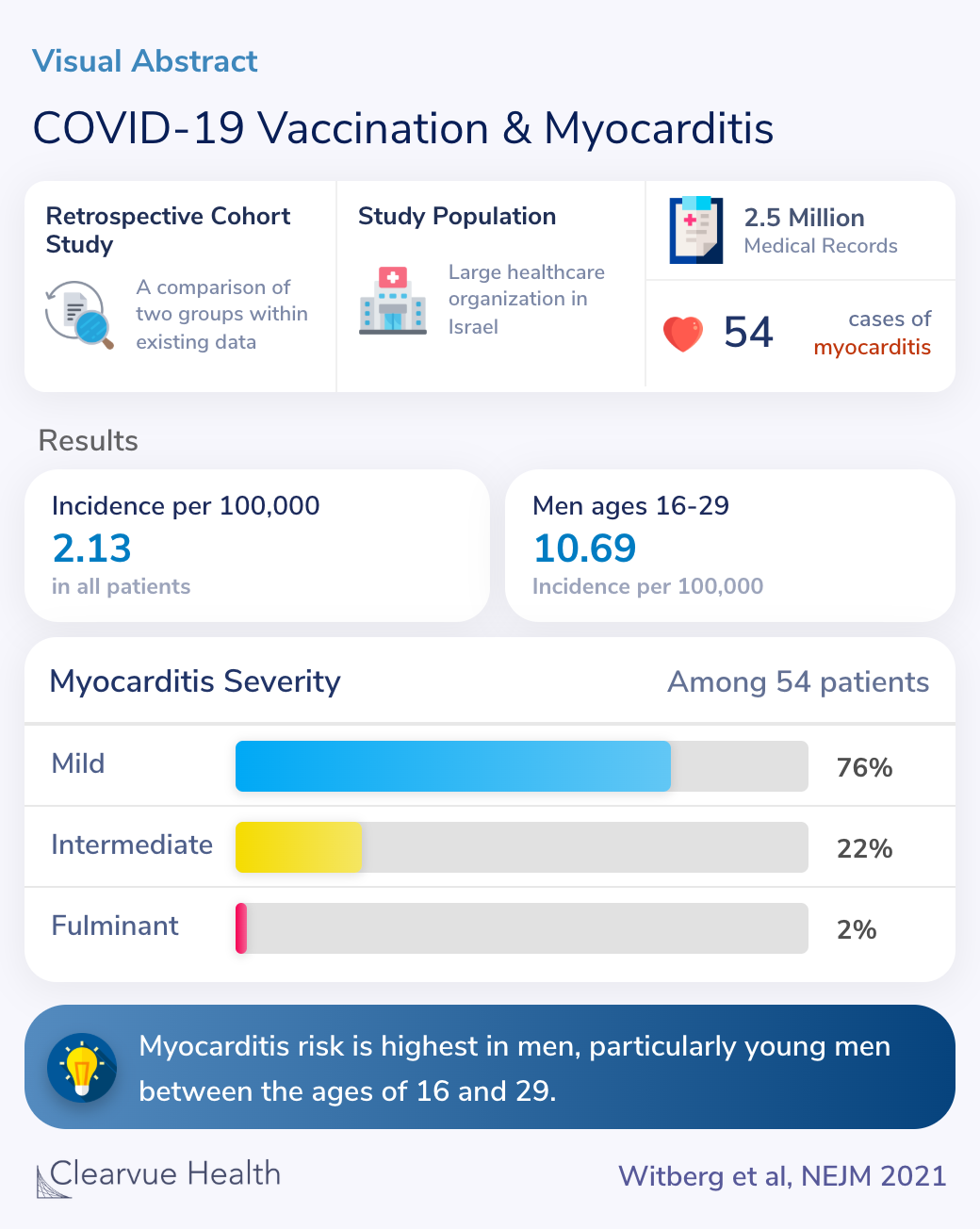COVID-19 Vaccination & Myocarditis
Myocarditis after Covid-19 Vaccination in a Large Health Care Organization
Reviewed by Charles Li, MD
July 19, 2023

Key Points
Background
Some studies suggest a link between COVID-19 vaccination and myocarditis.
But so far, we don't know enough about how often people get myocarditis after vaccination, and how severe it can get.
This study set out to answer this by looking at 2.5 million medical records in Israel.
Reports have suggested an association between the development of myocarditis and the receipt of messenger RNA (mRNA) vaccines against coronavirus disease 2019 (Covid-19), but the frequency and severity of myocarditis after vaccination have not been extensively explored.
Study Design
Researchers searched through the records of the largest healthcare organization in Israel for patients who had been diagnosed with myocarditis.
They then collected information on symptoms, severity, and outcomes.
We searched the database of Clalit Health Services, the largest health care organization (HCO) in Israel, for diagnoses of myocarditis in patients who had received at least one dose of the BNT162b2 mRNA vaccine (Pfizer–BioNTech)...Among more than 2.5 million vaccinated HCO members who were 16 years of age or older, 54 cases met the criteria for myocarditis.
Results
Overall, 2.13 out of every 100,000 vaccinated individuals developed myocarditis.
However, this didn't affect everyone equally. Your age and gender can dramatically alter your risk of myocarditis.
Men between age 16 and 29 were around 5x more likely to get myocarditis, with an incidence of 10.69 per 100,000.
The estimated incidence per 100,000 persons who had received at least one dose of vaccine was 2.13 cases (95% confidence interval [CI], 1.56 to 2.70). The highest incidence of myocarditis (10.69 cases per 100,000 persons; 95% CI, 6.93 to 14.46) was reported in male patients between the ages of 16 and 29 years. A total of 76% of cases of myocarditis were described as mild...
Men of all ages were significantly more likely to experience myocarditis than women. Myocarditis after vaccination was exceedingly rare in women, at around 1 case in 400,000 in this study.
The overall estimated incidence of myocarditis within 42 days after the receipt of the first dose per 100,000 vaccinated persons was 2.13 cases (95% confidence interval [CI], 1.56 to 2.70), which included an incidence of 4.12 (95% CI, 2.99 to 5.26) among male patients and 0.23 (95% CI, 0...
Results: Myocarditis Severity
Fortunately, most cases of myocarditis were mild. Researchers in this study were able to track how patients did after they got myocarditis.
76% of cases were mild in severity. 22% were intermediate. Only one patient had a severe case.
Conclusions
By analyzing medical records, researchers were able to estimate that the risk of myocarditis was highest in young men between 16-29.
After following cases of myocarditis, researchers determined that most cases were mild. Of the few patients with heart dysfunction, most returned to normal function.
Among patients in a large Israeli health care system who had received at least one dose of the BNT162b2 mRNA vaccine, the estimated incidence of myocarditis was 2.13 cases per 100,000 persons; the highest incidence was among male patients between the ages of 16 and 29 years. Most cases o...